MCX connectors are RF coaxial connectors designed for high-frequency signal transmission in compact electronic devices. In this blog, we will dive into the definition, standards, dimensions, specifications, types, comparisons with SMA and MMCX connectors, and leading manufacturers.
What is an MCX connector?
MCX connectors are sub-miniature RF connectors designed for applications requiring a small footprint without compromising performance.
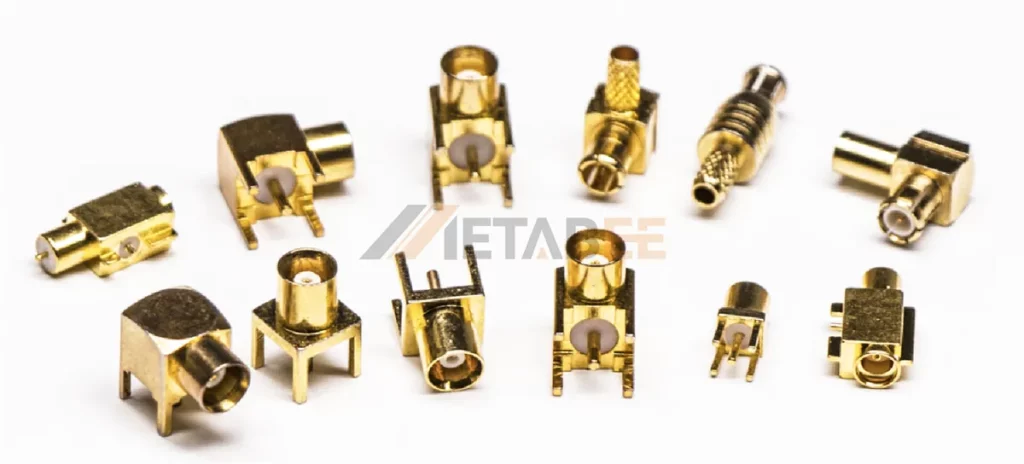
Definition
The MCX connector is a micro coaxial connector characterized by its compact design and snap-on coupling mechanism. Developed in the 1980s, it supports an impedance of 50 Ohms and operates frequencies up to 6 GHz.
Standard
- The MCX connector is designed and manufactured according to European CECC 22220 specifications. This standard defines tolerances for impedance, coupling mechanisms, dielectric materials, and durability.
- They comply with IEC 61169-36, ensuring standardized dimensions and performance criteria.
- They are also referenced in MIL-STD-348 for military-grade applications.
Design Mechanism and Materials
The MCX coax connector features a snap-on coupling mechanism, providing quick and easy connection and disconnection. The shell is made from brass with gold or nickel plating for corrosion resistance. The contacts are made from brass or phosphor with gold or nickel plating for enhanced conductivity. The insulators are commonly made of Teflon.
Materials and plating of N-type connectors:
| Shell | Brass |
| Shell Plating | Gold-plated or Nickel-plated |
| Contact | Brass or Phosphor |
| Contact Plating | Gold-plated or Nickel-plated |
| Insulator | Teflon |
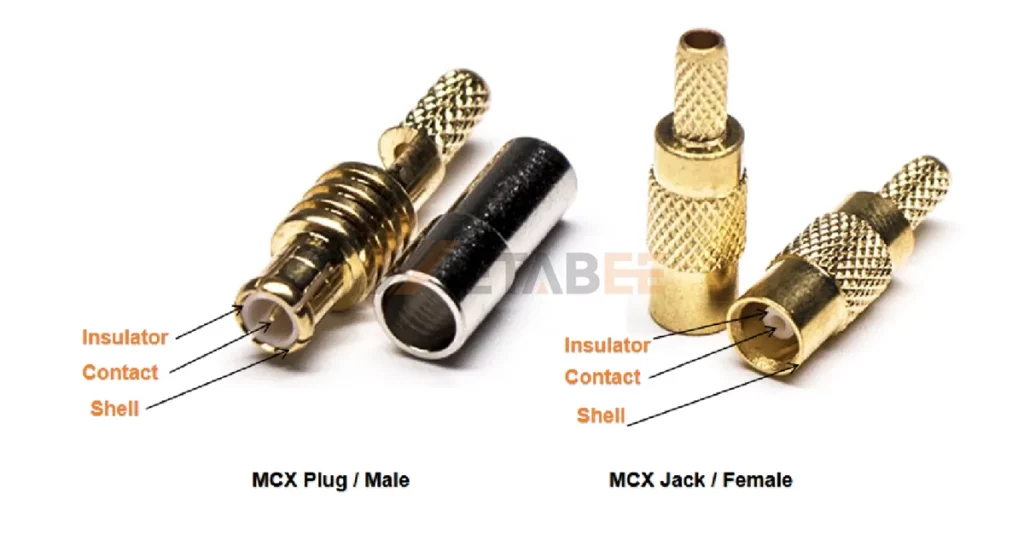
MCX Connector Dimensions
MCX coaxial connectors are well-known for their compact size and reliable RF performance. Their standardized dimensions ensure compatibility across various applications.
Interface Dimensions of MCX Female / Male Connector:
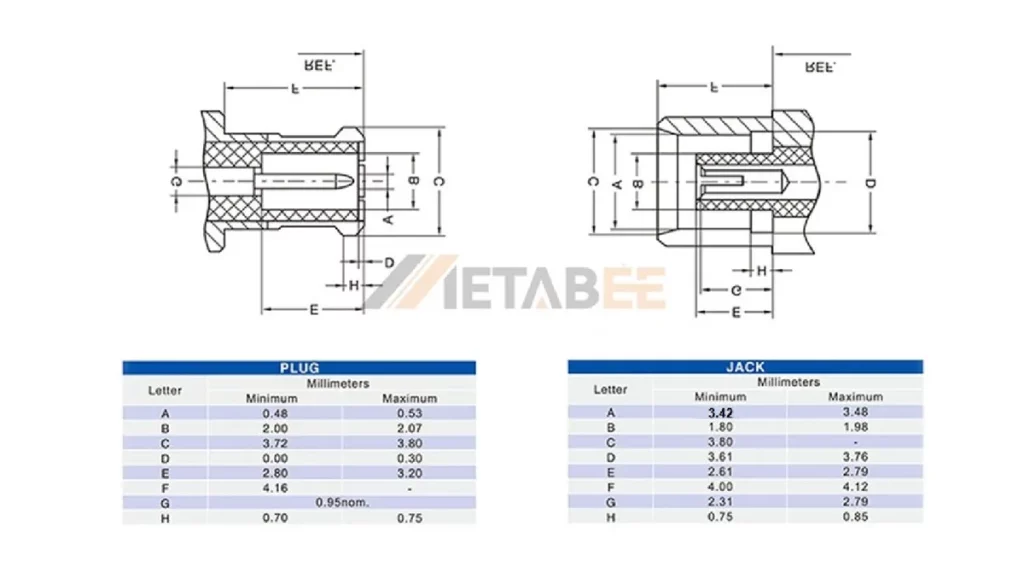
MCX Connector Specifications
MCX coaxial connectors are designed to meet specific performance criteria across electrical, mechanical, and environmental factors.
Below is a detailed breakdown of their specifications.
Electrical Characteristics
| Impedance | 50 Ohm |
| Frequency Range | DC to 6 GHz |
| VSWR | Straight Type ≤1.3 / Right-Angle type ≤1.5 |
| Dielectric Withstanding Voltage | 1000 V rms |
| Working Voltage | 335 V rms |
| Center Contact Resistance | ≦ 5.0 mΩ (Milliohms MAX . ) |
| Outer Contact Resistance | ≦ 1.0 mΩ (Milliohms MAX . ) |
| Insulation Resistance | ≧ 1000 MΩ (Megohms MIN . ) |
Mechanical Characteristics
| Coupling | Snap-on Coupling |
| Contact Retention | 4 in-lbs. min. |
| Coupling Nut Torque | 15 in-lbs min. |
| Durability (Mating) | ≧ 500 Cycles |
Environmental Characteristics
| Temperature Range | -65℃ to +155℃ |
| Vibration | MIL-STD-202 Meth.204 |
| Corrosion Resistance | MIL-STD-202 Meth. 101 |
7 Main Types of MCX Connector
MCX RF connectors come in various configurations, primarily categorized by their gender, mounting method, and orientation. We divide them into the 7 types.
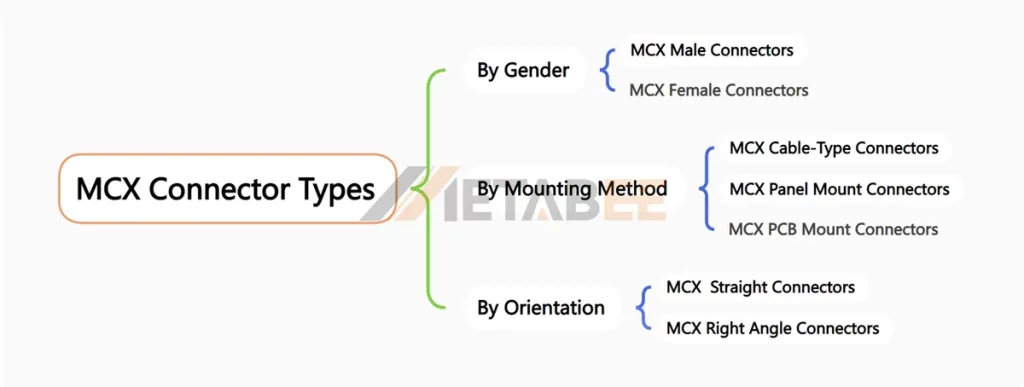
By Gender
MCX connector are available in male (plug) and female (jack) configurations, distinguished by their center contacts.
- Female/Jack MCX Connectors: The contact is a center receptacle that receives the male pin.
- Male/Plug MCX Connectors: The contact is a center pin that inserts into the female receptacle.
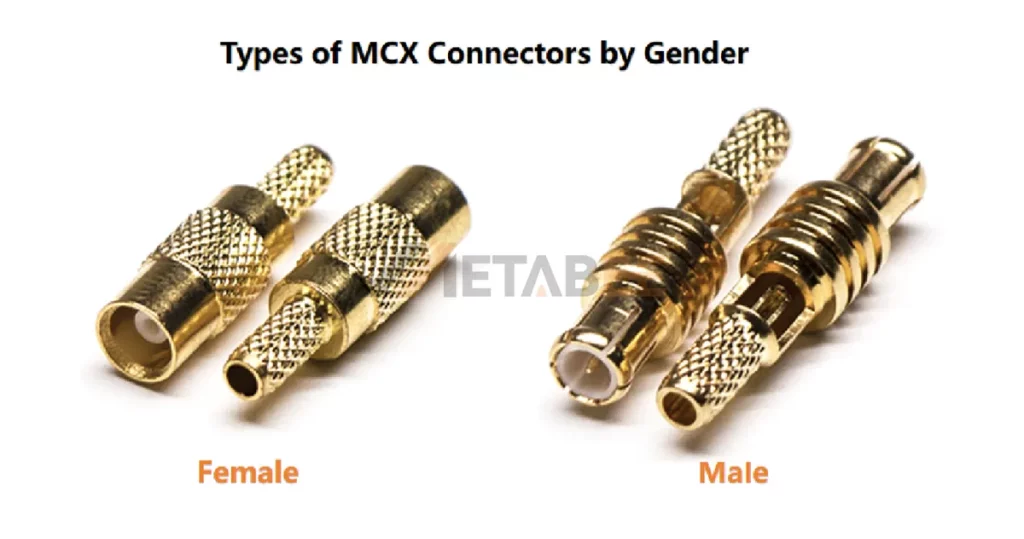
By Mounting Method
The mounting method of an MCX connector depends on how it is attached to a device or cable.
- Cable-Type MCX Connectors: These connectors are crimped or soldered onto coaxial cables. They provide a secure and reliable connection for transmitting signals along the cable.
- Panel Mount MCX Connectors: Designed to be installed on equipment panels or enclosures. These typically have 2-hole flange or bulkhead design
- PCB Mount MCX connectors: Soldered directly onto PCBs. There are available in surface-mount, edge-mount or through-hole configurations.
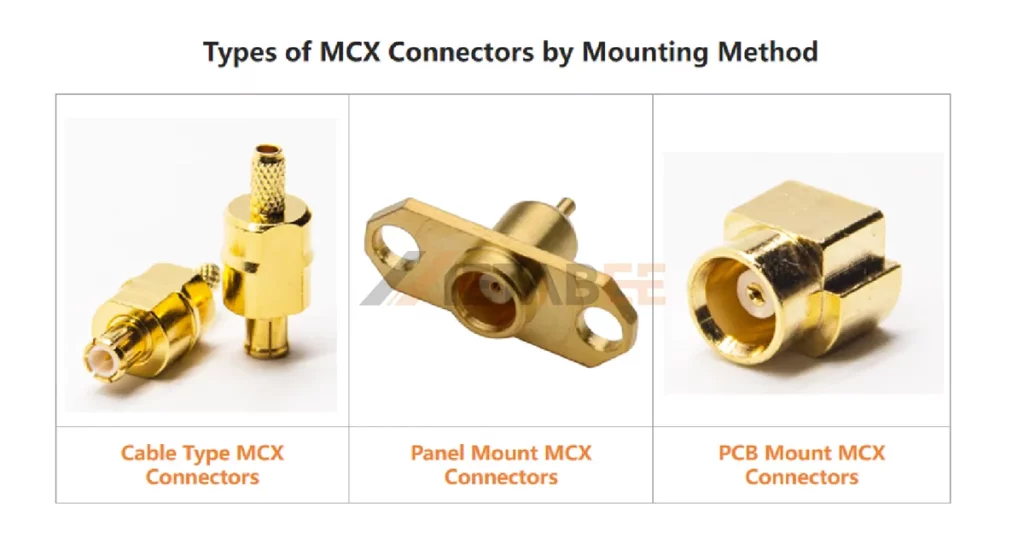
By Orientation
MCX connectors are available in straight or right-angle orientations to suit space and routing constraints.
- Straight MCX Connectors:Ideal for linear cable routing and direct line connections.
- Right Angle MCX Connectors:90° bend design is for space-saving layouts and help to manage cable routing effectively.
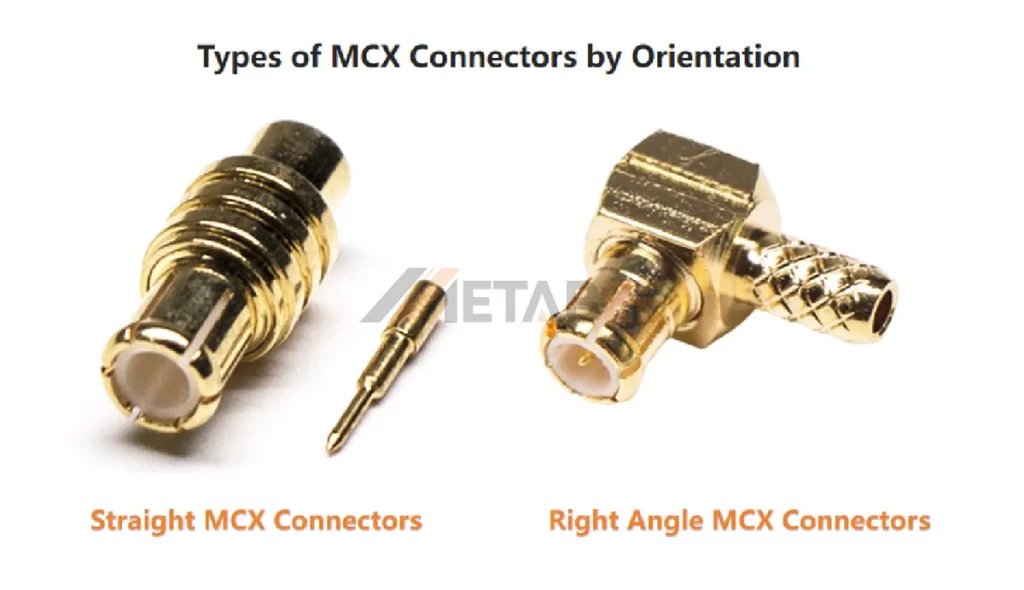
Applications of MCX Connector
The MCX connector’s compact size, excellent performance, and reliable snap-on coupling make it widely applicable in various applications where space and performance are critical. Here are main applications:
- GPS Receivers: Their small footprint makes them ideal for internal and external antenna connections in GPS devices.
- Wireless Communication Devices: Used in Wi-Fi modules, Bluetooth devices, and other compact wireless transceivers.
- Test and Measurement Equipment: Found in compact oscilloscopes, spectrum analyzers, and signal generators.
- Consumer Electronics: Integrated into small portable devices where RF signals are processed.
- Medical Equipment: Used in diagnostic and monitoring devices where space and signal integrity are paramount.
- Telecommunications: In base stations and other network infrastructure components where miniaturization is beneficial.
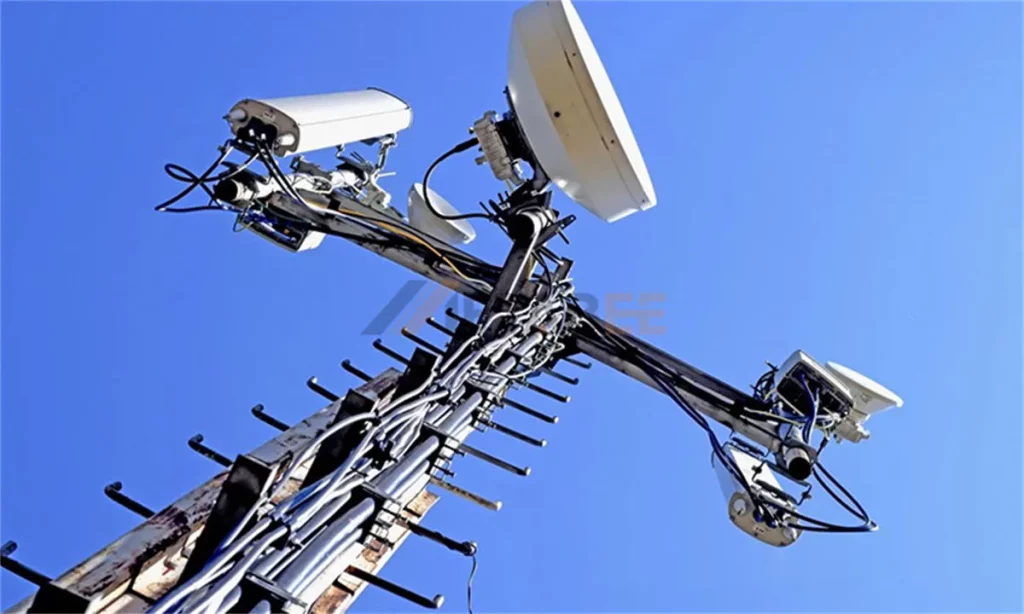
Applications of the MCX Connector
MCX vs. MMCX Connector
The MCX and MMCX connectors are both types of RF coaxial connectors that share similar snap-on coupling mechanisms. But the primary difference lies in size between the two connectors. MMCX connectors are 30% smaller than the MCX connectors. They are a further miniaturization of MCX connectors, making them ideal for ultra-compact designs.
Here is the male/female size comparison of the two connectors:
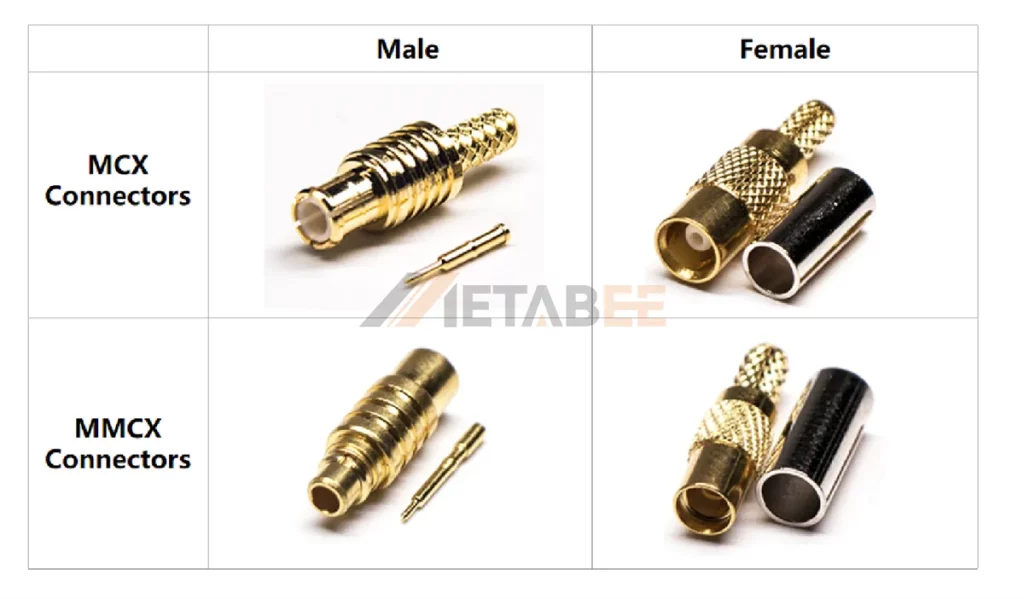
MCX vs. MMCX Connector
The Leading MCX Connector Factories and Manufacturers
Top-rated MCX connector factories and manufacturers include:
- Amphenol: Known for high-reliability RF solutions.
- TE Connectivity: Delivers standardized and customizable MCX components.
- Molex: A major global electronics company, it produces a variety of connectors, including MCX types, known for their broad product portfolio and strong engineering capabilities.
- Rosenberger: Offers precision MCX connector for telecom and automotive sectors.
- Metabee: A competitive factory-direct manufacturer with a wide product portfolio and responsive technical support.
- Renhotec: A well-known manufacturer of electronic components, including a comprehensive portfolio of RF connectors.
- Hirose Electric (HRS): Known for its high-quality and innovative connector designs, including compact RF connectors.
Conclusion
MCX RF connectors, with their compact dimensions, reliable snap-on coupling, and strong electrical characteristics up to 6 GHz, are indispensable components in modern miniaturized electronic devices. What’s more, there are various types available, ranging from straight and right-angle to cable-type, PCB mount, and panel mount configurations. Telecommunications, GPS, medical, and military systems widely use the MCX connector..
When compared to MMCX connectors, MCX connectors strike a balance between size and performance, providing better mechanical stability than MMCX connectors. As technology continues to miniaturize, they will undoubtedly remain a key solution for high-performance, space-constrained RF interconnections.
For further exploration, consider related products as follows. Please do not hesitate to contact and ask us anything.
Related Products
- MCX Connectors
- MMCX Connectors
- MCX Adapters
- MMCX Adapters
- MCX Cable Assemblies
- MMCX Cable Assemblies
FAQS
Q1: What is an MCX connector?
A: An MCX connector is a miniature RF connector for high-frequency applications. It features a snap-on coupling mechanism and is famous for its compact size and reliable performance.
Q2: What is the frequency range of MCX RF connectors?
A: MCX connectors support frequencies up to 6 GHz.
Q3: What are the key features of an MCX connector?
The main features of an MCX connector include:
- Small Size: Typically smaller than other RF connectors like SMA or BNC.
- Snap-on Coupling: Allows quick and easy connection and disconnection.
- Electrical Performance: Provides impedance of 50 Ohms and a frequency range of up to 6 GHz.
- Durability: Designed to withstand more than 500 mating cycles.
Q4: What are the key differences between SMA and MCX connectors?
A: SMA connectors are generally larger, threaded, and offer higher frequency capabilities (up to 18 GHz), making them suitable for more robust and higher-performance applications. MCX connectors are smaller, snap-on, and designed for space-constrained, moderate-frequency applications.
Q5: What is the difference between MCX and MMCX connectors?
A: MMCX connectors are an even smaller version of MCX connectors, also featuring a snap-on coupling. While both are miniature, MMCX is even more compact and often used in extremely space-limited applications.
Q6: Are MCX and MMCX connectors interchangeable?
A: No, MCX and MMCX connectors are not interchangeable due to their different sizes, despite both having snap-on coupling. MMCX connectors are significantly smaller than MCX.